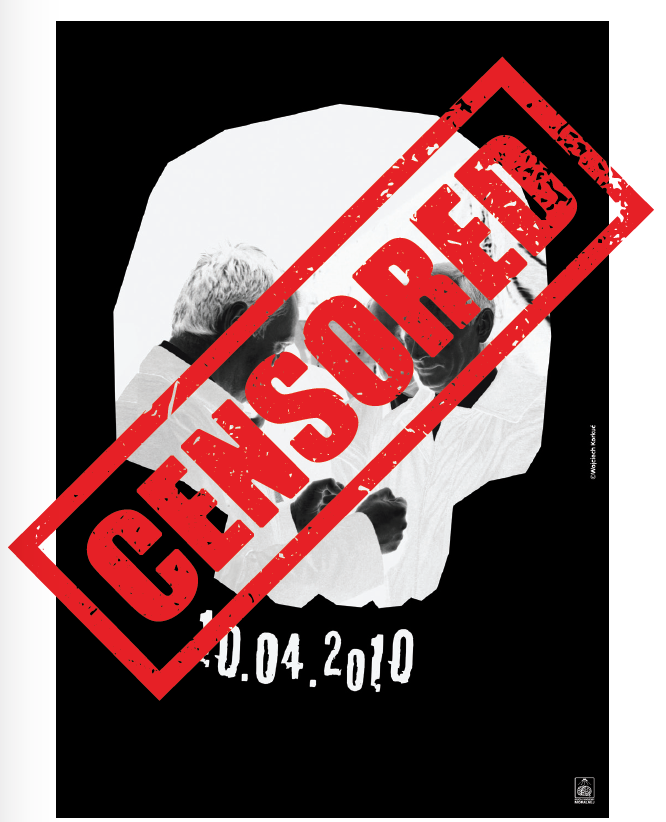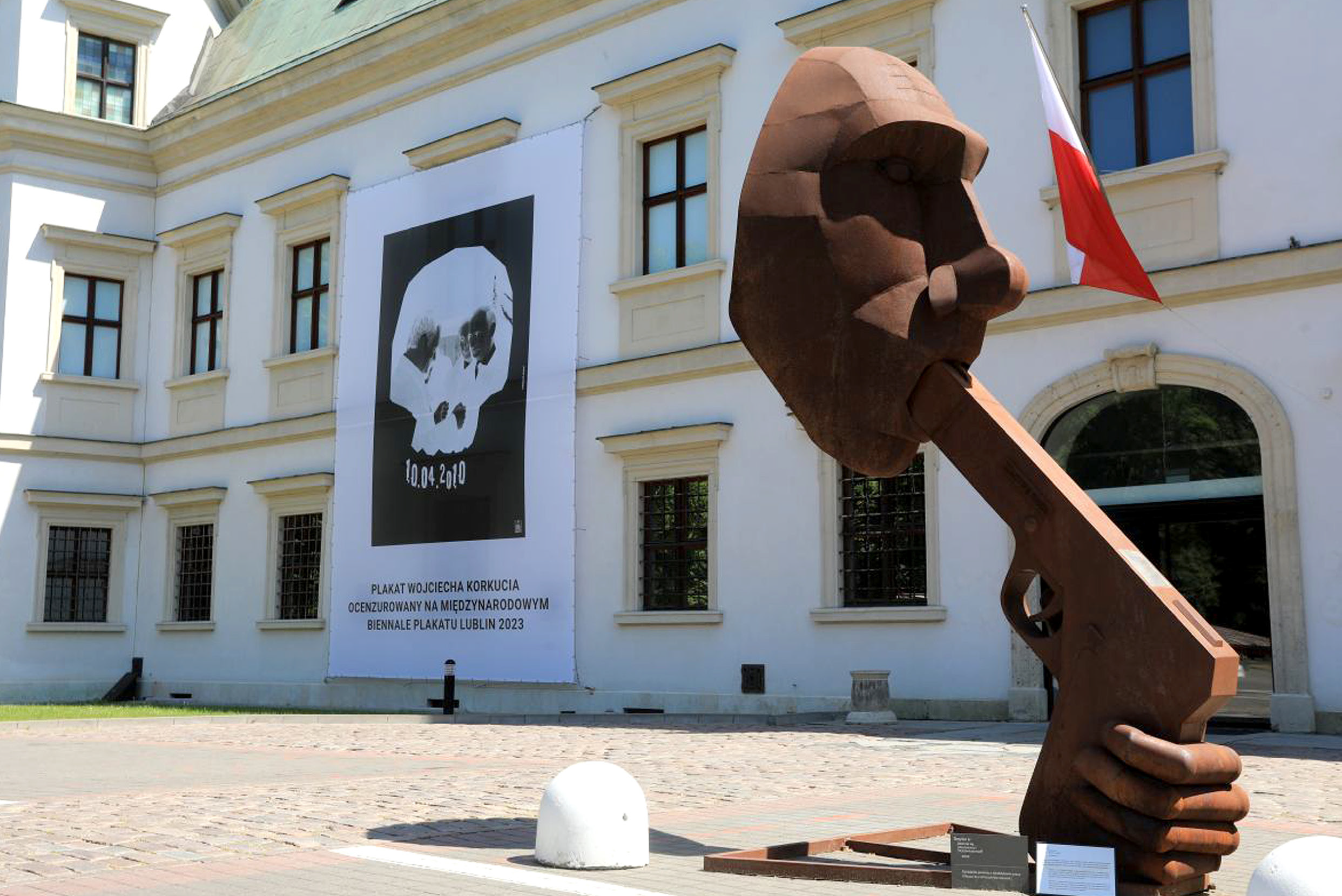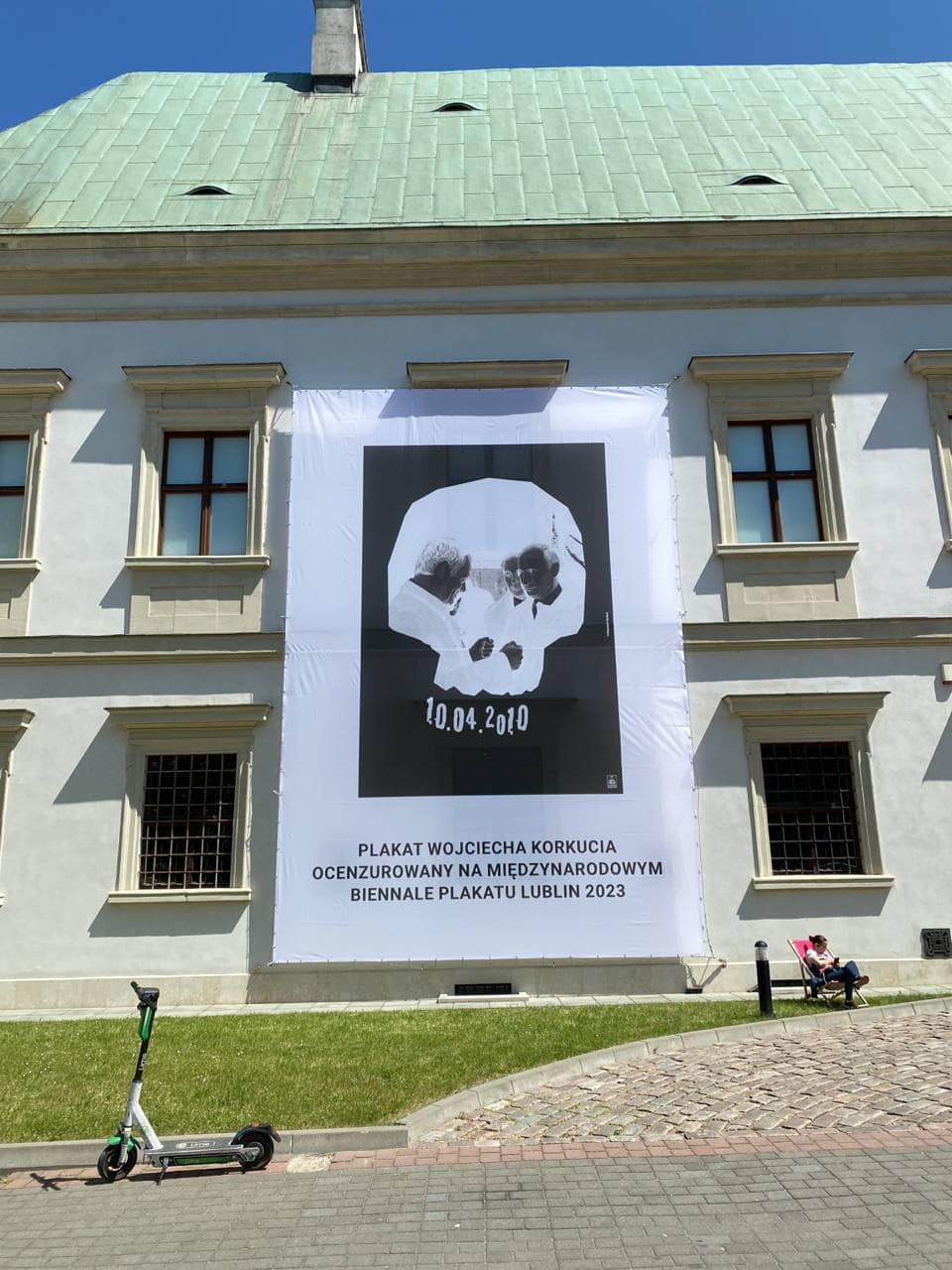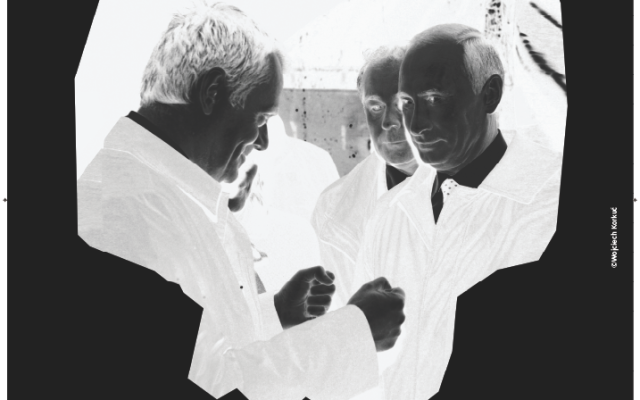The Lublin International Poster Biennale is organised by the Maria Curie-Skłodowska University in Lublin and the Centre for the Meeting of Cultures in Lublin. The event is an open competition in which artists can submit posters that will then be the subject of an international jury’s assessment. The competition exhibition is a presentation of the jury’s shortlist of works, the best of which are awarded prizes. The sixth edition of the biennial took place last year, featuring a selection of the best posters from 2021 to 2023.
Polish poster artist Wojciech Korkuć, author of the famous 2014 “Attention Russia!” poster, using the open form of the event, submitted his new poster related to the 10 April 2010 Polish government plane crash near Smolensk, which killed, among others, Polish President Lech Kaczynski and his wife. The artist used a photograph taken immediately after the crash, showing a meeting between the Russian and Polish prime ministers, Vladimir Putin and Donald Tusk, at the site of the incident. The inverted photograph was inserted into the outline of the skull and dated 10.04.2010.

Censored poster by Wojciech Korkuć,
submitted to the Lublin International Poster Biennale
Korkuć’s work was selected by the jury from 3,500 submissions as one of two hundred shortlisted works for the competition exhibition. All the results of the competition were published on the website. One of the artists who was also on the shortlist for the exhibition, Szymon Szymankiewicz, was outraged by this fact and, as part of his protest against the presence of Korkuć’s poster, decided to withdraw from the exhibition. In a letter of protest, the artist criticised the use of a photograph of Tusk and Putin, referring to the competition’s honorary patron, the mayor of Lublin, Krzysztof Żuk:
Korkuć's work was selected by the jury from 3,500 submissions as one of two hundred shortlisted works for the competition exhibition. All the results of the competition were published on the website. One of the artists who was also on the shortlist for the exhibition, Szymon Szymankiewicz, was outraged by this fact and, as part of his protest against the presence of Korkuć's poster, decided to withdraw from the exhibition. In a letter of protest, the artist criticised the use of a photograph of Tusk and Putin, referring to the competition's honorary patron, the mayor of Lublin, Krzysztof Żuk:
Due to the qualification of Wojciech Korkut's work for the 6th International Poster Biennale Lublin, in which the leader of the Civic Platform, Donald Tusk, and Vladimir Putin, who has led a criminal war in Ukraine for the past year, are depicted smiling at each over in a cadaver skull, I have decided to withdraw my work from the Lublin Biennale. [...] At the same time, I am surprised that the above-mentioned poster was qualified for an event co-organised by the Institute of Fine Arts of the Maria Curie-Skłodowska University and all under the patronage of Krzysztof Żuk, the Mayor of Lublin.
It is worth noting that Krzysztof Żuk is a member of the Civic Platform, led by Donald Tusk. Mentioning him in the letter can be seen as a way of suggesting that the city's political patrons might not like the poster's presence. Szymon Szymankiewicz is a poster artist whose work, similar to that of Wojciech Korkuć, relates to Polish politics and social issues. He rose to fame with a poster that accused the leader of the Law and Justice party - the opposition to the Civic Platform - of having inspired a political murder. The murder of the mayor of Gdansk, Paweł Adamowicz, committed by a madman and a criminal, had nothing to do with current politics, although Civic Platform politicians and Szymon Szymankiewicz tried to promote this thesis.

Information about the censorship of the poster
on a banner displayed at the Center for Contemporary Art Ujazdowski Castle, Warsaw.
With the support of the newspaper Gazeta Wyborcza, which is sympathetic to the Civic Platform, Szymankiewicz made his protest public by putting effective pressure on the jury. The first step taken by the jury was to remove from the Biennale's website the list of works chosen in the selection process to be presented in the competition exhibition. It was then decided to hold a further, additional meeting of the jury and to re-examine the projects that had been submitted for the presence of so-called 'hate speech' in them.
Due to the concerns of the artistic community and insinuations appearing in the media, we hereby declare that there is no place in the Lublin International Poster Biennial for works expressing hatred towards anyone for any reason. We are firmly opposed to such attitudes and do not intend to tolerate such actions," the organisers said in a statement published on social media.[1]
Following renewed deliberations, only one work - a poster by Wojciech Korkut - was withdrawn from consideration.

Information about the censorship of the poster
on a banner displayed at the Center for Contemporary Art Ujazdowski Castle, Warsaw.
Moreover, looking for the characteristic of "hating anyone for any reason" in posters and treating this as a disqualifying criterion could lead to excluding anti-fascist posters from many exhibitions. The posters of John Heartfield would most likely be excluded from being shown at the Lublin Biennale, not to mention the works that condemn Putin and his aggression against the Ukraine. In this case, 'hate speech' was a useful tool of political censorship. This censorship needs to be examined in a local context, where the Civic Platform had real power and influence in the media. It was able to exert pressure on the actions of the organisers, for whom the presentation of the poster of Korkuć might have unwelcome consequences (i.e. withdrawal of the support of the Mayor and the media). This is also a clear case of political censorship aimed at protecting a post-1989 Polish political figure's image.
[1] Censorship at the Lublin Poster Biennale? Wojciech Korekut's graphics caused a storm (Orig. title: Cenzura na Biennale Plakatu w Lublinie? Grafika Wojciecha Korkucia wywołała burzę), article published at www.tysol.pl 25.05.2023, (accessed: 26.02.2024).


